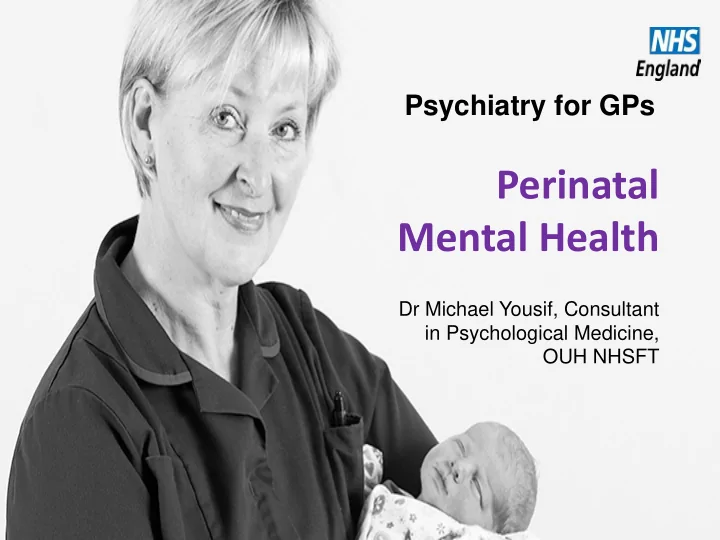

Psychiatry for GPs Perinatal Mental Health Dr Michael Yousif, Consultant in Psychological Medicine, OUH NHSFT
Perinatal mental health for GPs • Diagnosing • Prescribing www.england.nhs.uk 2
Perinatal mental health for GPs Is this medication safe in pregnancy? Are the risks of this medication justified for this patient ? www.england.nhs.uk 3
Decision making Risks of medication Risks of not taking • Infant exposure • Undertreatment • In utero Evidence and • Lacation individual-based • Maternal morbidity • Maternal anxiety Evidence-based www.england.nhs.uk 4
Key principles: prescribing • Baseline 10-20% miscarriage, 2-3% malformations (Henshaw et al 2017) • Avoid first trimester prescribing wherever possible • Infant outcomes multifactorial • Minimise foetal exposure by avoiding drug switching • Consider what has worked before for the patient • All prescribing is off-label • Informed choice paramount • Reading material…Bumps www.england.nhs.uk 5
Key principles: evidence-base • Observational studies vs experimental studies • Single study associations, open label studies • Confounding by indication • Association vs causation • Relative risks vs absolute risks • Statistical significance vs clinical significance • Absence of evidence ≠ Evidence of absence • Few long-term studies www.england.nhs.uk 6
Key principles: breastfeeding • Most studies are in pregnancy • Aim to continue same drug in breastfeeding from pregnancy • Lithium, clozapine most risky • Placental exposure 5-10x breast milk (Howard et al 2014) • Practical considerations • Nocturnal sedation, ‘pump and dump’, drug half-life www.england.nhs.uk 7
Antidepressants • Limited direct evidence of efficacy • Depressive relapse rate 68% if discontinue meds, 26% if continued (Henshaw et al 2017) • Large studies • Unlikely to be teratogenic • Equivocal evidence of cardiac malformation and PPHN • ARI 2/1000 for paroxetine (Henshaw et al 2017) • OR ~1.5 spontaneous abortion, inconsistent finding, multiple confounders (Ross et al 2013) • OR ~1.5 preterm delivery (days) (Ross et al 2013) www.england.nhs.uk
Antidepressants • IUGR evidence equivocal • Associated with PNAS, lower Apgar scores, NICU admission • Withdrawal or SE / toxicity? • Definition / measures • Likely benign, self-limiting • ASD – SSRIs, equivocal evidence, confounding by indication • Increased risk of speech / language disorders up to age 9 (Brown et al 2016) www.england.nhs.uk
Antipsychotics • Quetiapine, olanzapine, risperidone, haloperidol best studied • Long-term adverse cognitive outcomes, teratogenicity seem unlikely • SEs possible in neonate • Increased maternal and infant morbidity/mortality, obstetric complication • Not due to medication…confounding by indication • No consistent increase in • Maternal outcomes: GDM, HTN, VTE • Infant outcomes: prematurity, baby size, NAS • More likely to need interventional delivery (Vigod et al 2013) www.england.nhs.uk 10
Mood stabilisers • Most evidence from epilepsy studies • Confounding by indication • Valproate, carbamazepine relatively contraindicated (NICE) • Craniofacial, cardiac, cognitive, neurodevelopmental, miscarriage • Lamotrigine unlikely teratogenic (Chisolm and Payne 2015) • Inconsistent evidence about oral cleft • Lithium (Chisolm and Payne 2015) • Ebstein’s anomaly 1/1000 Avoid 1 st trimester – foetal heart monitoring • Blood volume changes, lithium metabolism, monthly weekly levels • • Neonatal thyroid problems, arryhthmias • Breastfeeding risks www.england.nhs.uk 11
Anxiolytics • Oral cleft • Evidence recently disputed • Neonatal withdrawal • Floppy baby syndrome • Gut atresia • Promethazine for insomnia (NICE) but more evidence Z-drugs Chisolm and Payne 2015, Taylor et al 2015, Henshaw et al 2017 www.england.nhs.uk 12
NICE CG192 • TCAs, SNRI, SSRIs for depressive and anxiety disorders • Avoid paroxetine • Antipsychotics as mood stabilisers Lithium 2 nd line • • Avoid valproate • Promethazine for sleep • ECT for severe illness www.england.nhs.uk 13
Where to gt help References Services • UKTIS / BUMPS website • AMHT • Maudsley Prescribing • IAPT Guidelines • OUH Maternity • BAP Guidelines • Specialist PMH CMHT McAllister-Williams et al ( 2017) Journal of Psychopharmacology 1- 34 www.england.nhs.uk 14
References 1. Boukhris et al JAMA Pediatr . 2016;170(2):117-124. 2. Brown et al JAMA Psychiatry. 2016;73(11):1163-1170 3. Chisolm and Payne BMJ 2015; 351:h5918 4. Furu et al BMJ 2015; 350: h1798 5. Howard et al Lancet 2014; 384: 1775-88 6. Henshaw et al RCPsych Modern Management of Perinatal Psychiatric Disorders (2 nd ed.) 2017 7. Jones et al Lancet 2014; 384: 1789-99 8. Myles et al A NZ J Psych 47(11) 1002–1012 9. Reefhuis et al BMJ 2015; 351: h3190 10. Ross et al JAMA Psychiatry. 2013;70(4):436-443. 11. Stein et al Lancet 2014; 384: 1800-19 12. Taylor et al Maudsley Prescribing Guidelines in Psychiatry (12 th ed.) 2015 13. Vigod et al BMJ 2015; 350:h2298 www.england.nhs.uk 15
Recommend
More recommend